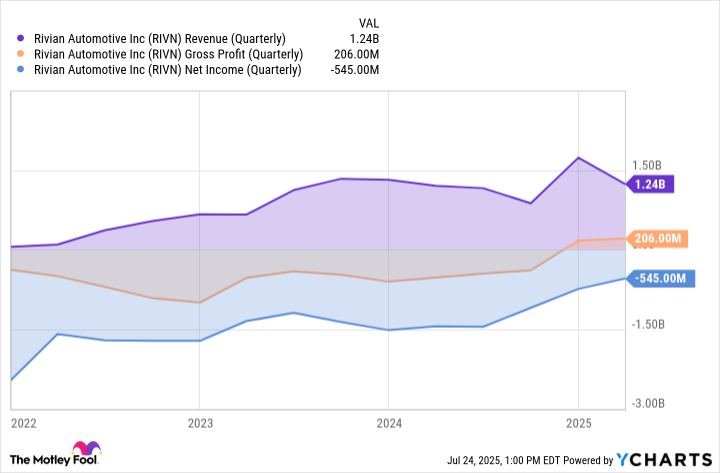Rivian Automotive (RIVN -3.61%) has captured some investor attention in its quest to establish its place in the electric vehicle (EV) market. Following a meteoric rise after its initial public offering in late 2021, Rivian's stock plummeted in the two years that followed. The stock is still down 92% from its peak.
However, recent developments, including its announcement of a joint venture with Volkswagen (VWAP.Y 0.56%) and consecutive quarters of positive gross profits, show that Rivian may be turning a corner. Still, challenges remain as the company prepares to expand its manufacturing capacity and scale up production over the next several years. If you're thinking of investing in Rivian, here's what you need to know.
Rivian's in-house focus and technology platform
Rivian manages nearly all aspects of its business, from engineering to manufacturing, in-house. The company has developed a technology platform that encompasses a comprehensive software stack, covering everything from vehicle controls to the user interface, and enabling over-the-air updates and feature enhancements. Additionally, it features an in-house built autonomy platform with driver-assist technology that can be utilized for autonomous driving.
The company leveraged this technology to establish a joint venture with the Volkswagen Group that focuses on software, electronic control units (ECUs), and related network architecture design and development.
Volkswagen plans to utilize Rivian's zonal ECU architecture and software stack across its multiple brands. In November, Rivian received $1.3 billion for intellectual property licensed to Volkswagen. Volkswagen has also committed to making additional equity investments of up to approximately $2.5 billion in multiple tranches.
Amazon is a major customer and investor
One key aspect of Rivian's business since 2019 has been its partnership with Amazon (AMZN -1.09%) to develop the Rivian Commercial Van and Electric Delivery Van variants. Today, there are more than 20,000 of these vehicles on the road. In November 2023, their agreement was amended to adjust specific exclusivity rights for Amazon, allowing Rivian to sell its commercial vans to other customers.

Image source: Rivian.
The Amazon contract has been a major portion of Rivian's business. In 2024, Rivian generated over $1.04 billion in revenue from Amazon -- 21% of its total revenue. In 2025's first quarter, revenue from Amazon totaled $99 million, a significant decrease from the $338 million reported in the same quarter last year.
Amazon also holds a significant stake in Rivian, representing 13.3% of its voting power. This partnership with one of the world's largest retailers has been instrumental in helping Rivian establish its foothold in the competitive automotive industry. Still, it will be crucial for the EV maker to develop its other partnerships and revenue streams.
What's next for Rivian?
Rivian has a history of incurring significant net losses, including a net loss of $4.8 billion last year and a $541 million loss in 2025's first quarter.
However, the company did achieve a gross profit of $206 million in Q1, its highest gross profit to date. It was also the company's second consecutive quarter of gross profitability. Management expects to achieve a positive gross profit for 2025 as it continues to focus on cost efficiencies.
RIVN Revenue (Quarterly) data by YCharts.
The EV maker will continue to ramp up production and add to its facilities. It plans to build a second manufacturing facility near Social Circle, Georgia, to meet demand from the United States and international markets. The plant is expected to have an annual capacity of 400,000 vehicles. It will be built in two phases, each contributing 200,000 units of annual capacity.
Construction of that Georgia facility is expected to begin in 2026, with production on the first manufacturing line projected to start in 2028. Vehicles produced there will be on the company's midsize platform, which includes its R2 and R3 models. Development of this facility is supported by a loan arrangement with the U.S. Department of Energy for up to approximately $6.6 billion.
Is Rivian right for you?
Rivian is expanding its manufacturing footprint, strategically developing its software and services ecosystem, and forming strategic partnerships with key customers and partners. The company is making solid progress in revenue and gross profit, and I would like to see it continue to improve its cost efficiency and profitability.
Investors buying today could be getting on the ground floor. That said, analysts project that the EV maker will continue to lose money through 2028, as it will take time and capital to build out its facilities and scale up production. For these reasons, Rivian is a high-risk, high-potential-reward stock that may take years to pay off, making it best suited for aggressive investors with long-term buy-and-hold timelines.






